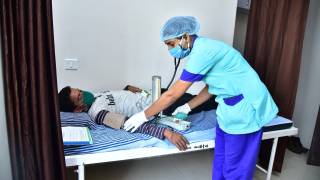Human Genetics Identify Potential COVID-19 Treatments

Potential treatments for COVID-19 have been identified by researchers from the University of Edinburgh after the discovery of five genes associated with the most severe form of the disease.
These genes are involved in two molecular processes, antiviral immunity, and lung inflammation.
According to the new study published by the journal Nature on December 11, 2020, genetic evidence is second only to clinical trials as a way to tell which treatments will be effective in a disease.
The research team found key differences in five genes; IFNAR2, TYK2, OAS1, DPP9, and CCR2.
‘Our results identify robust genetic signals relating to key host antiviral defense mechanisms, and mediators of inflammatory organ damage in COVID-19. Both mechanisms may be amenable to targeted treatment with existing drugs, wrote these researchers.
However, ‘large-scale randomized clinical trials will be essential before any change to clinical practice.’
These researchers are from the GenOMICC consortium and made this discovery by studying the DNA of 2,700 patients in 208 intensive care units in the UK.
Having highlighted the genes, the team were then able to predict the effect of drug treatments on patients, because some genetic variants respond in a similar way to particular drugs.
For example, they showed that a reduction in the activity of the TYK2 gene protects against COVID-19. A class of anti-inflammatory drugs called JAK inhibitors, which includes the drug baricitinib, produces this effect.
They also discovered that a boost in the activity of the gene INFAR2 is also likely to create protection because it is likely to mimic the effect of treatment with interferon - proteins released by cells of the immune system to defend against viruses. However, experts caution that to be effective, patients might need the treatment early in the disease.
Dr. Kenneth Baillie, the project's chief investigator and Academic Consultant in Critical Care Medicine and Senior Research Fellow at the University of Edinburgh's Roslin Institute, said in a press statement: "This is a stunning realization of the promise of human genetics to help understand the critical illness.”
“Just like in sepsis and influenza, in Covid-19, damage to the lungs is caused by our own immune system, rather than the virus itself. Our genetic results provide a roadmap through the complexity of immune signals, showing the route to key drug targets.
"Our results immediately highlight which drugs should be at the top of the list for clinical testing. We can only test a few drugs at a time, so making the right choices will save thousands of lives.”
"This work is only possible because of the generous contribution of the patients themselves and their families, research teams in NHS hospitals across the country, and the generous funding we've received from the public and organizations."
GenOMICC is funded by the charity Sepsis Research FEAT, the Intensive Care Society, Wellcome, UK Research and Innovation, Scotland's Chief Scientist Office, and the Department of Health and Social Care via the National Institute for Health Research. No researcher conflicts of interest were disclosed.
PrecisionVaccinations publishes research-based news.
Our Trust Standards: Medical Advisory Committee

























